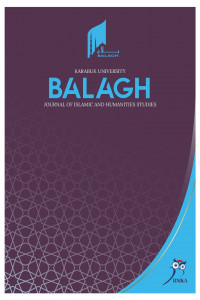Abstract
Abstract: The rulings in Islamic criminal jurisprudence are divided into two parts: The
first section is fixed rulings stipulated in the Qur’an and Sunnah, and these rulings are not
subject to change, and no one has the right to amend them regardless of his authority, as is
the case regarding crimes of hudud and retribution. The other part is rulings that are not
stipulated in the Qur’an and Sunnah and are flexible and subject to change according to
changing times, interests, and places. Given that the Shari’a is based on considering the
interests of people, these rulings have been entrusted to Muslim rulers or judges who have
a good knowledge of legal rulings. The interest in the judgments they decide, and they have
the right to issue whatever rulings they want based on the interest they see. This is called
discretionary authority, and it is the authority that the guardian or judge possesses, and
which authorizes him to rebuke everyone who is begging him to violate the security of
people and societies, but this power is not absolute until it is not the passions of rulers and
judges enable them to harness Sharia to serve their interests, which is: Not to violate the
provisions of Sharia law and its general rules, taking into consideration the public interest,
Presence of the criminal text and ensuring that all people are aware of it (warning before
punishment), Compatibility between criminalization, punishment and considering gradual
discretionary punishment, considering the condition of the perpetrator when deciding on
the punishment. And Moderation in deciding on sanctions and avoiding insulting human
dignity
References
- األحكام السلطانية والواليات الدينية، أبو الحسن علي بن محمد بن حبيب البصري البغدادي الماوردي الوفاة: 450هـ، دار النشر: دار الكتب العلمية - بيروت - 1405هـ- 1985م.
- بدائع الصنائع في ترتيب الشرائع، اسم المؤلف: عالء الدين الكاساني الوفاة: 587 ،دار النشر: دار الكتاب العربي - بيروت - 1982 ،الطبعة: الثانية.
- تبصرة الحكام في أصول األقضية ومناهج األحكام، لبرهان الدين أبي الوفاء إبراهيم ابن اإلمام شمس الدين أبي عبد اهلل محمد بن فرحون اليعمري، دار الكتب العلمية - لبنان/ بيروت - 1422هـ - 2001م.
- تبين الحقائق شرح كنز الدقائ ق، اسم المؤلف: فخر الدين عثمان بن علي الزيلعي الحنفي. الوفاة: 743 ،دار النشر: دار الكتب اإلسالمي. - القاهرة. - 1313هـ.
- التشريع الجنائي اإلسالمي مقارنا بالقانون الوضعي، للدكتور عبد القادر عودة.
- التعزير ضوابطه العامة وتطبيقاته في المملكة العربية السعودية، للدكتور عبد الفتا ح خضر.
- الجريمة والعقوبة في الفقه اإلسالمي (الجريمة)، لإلمام محمد أبو زهرة، دار الفكر العربي، القاهرة، طبعة: 1998م.
- حاشية رد المحتار على الدر المختار شرح تنوير األبصار، تأليف: ابن عابدين، دار النشر: دار الفكر للطباعة والنشر. - بيروت. - 1421هـ - 2000م.
- الخرشي على مختصر سيدي خليل، لمحمد بن عبداه الخرشي، دار الفكر للطباعة – بيروت.
- الذخيرة، اسم المؤلف: شهاب الدين أحمد بن إدريس القرافي الوفاة: 684 ،دار النشر: دار الغرب - بيروت - 1994م.
Abstract
لخص البحث : إن الأحكام في الفقه الجنائي الإسلامي تنقسم إلى قسمين: القسم الأول هو أحكام
اثبتة منصوص عليها في الكتاب والسنة وهذه الأحكام غير قابلة للتغيير ولا يملك أحد أن يعدلها مهما
كانت سلطته كما هو الحال عليه في جرائم الحدود والقصاص. والقسم الآخر هو أحكام غير منصوص
ً لتغير الأزمان والمصالح
عليها في الكتاب والسنة مبنية علی المصلحة والعرف وهي مرنة قابلة للتغير وفقا
ً إلى أن مبنى الشريعة على مراعاة مصالح الناس فإن هذه الأحكام أوكلت إلى ولاة المسلمين
والأماكن ونظرا
أو القضاة الذين لهم ابع في معرفة الأحكام الشرعية، لذا فإن من واجبهم تحري وجوه المصلحة فيما
يقررونه من أحكام ولهم أن يصدروا ما يشاؤون من أحكام بناء على المصلحة التي يرتؤو�ا وهذا ما يسمى
ّله زجر كل من تسول له نفسه في التعدي
ابلتعزير وهو السلطة التي يمتلكها ولي الأمر أو القاضي والتي تخو
على أمن الناس واجملتمعات ولكن هذه السلطة ليست مطلقة حتى لا تتمكن الأهواء من نفوس الحكام
والقضاة فيسخروا الشريعة لخدمة مصالحهم وإنما هي مضبوطة بضوابط وقواعد وضعها الفقهاء – رحمهم
الله – حاولنا في هذا البحث تسليط الضوء على أهمها، وهي: عدم مخالفة نصوص الشريعة وقواعدها
العامة ، و مراعاة المصلحة العامة ، و وجود النص التجريمي وضمان علم كافة الناس به (الإنذار قبل العقاب) ،
و الملائمة بين التجريم والعقاب ومراعاة التدرج في العقوبة التعزيرية، و مراعاة حال الجاني لدى تقرير العقوبة ،
و الاعتدال في تقرير العقوابت وتجنب إهانة الكرامة الإنسانية
Keywords
References
- األحكام السلطانية والواليات الدينية، أبو الحسن علي بن محمد بن حبيب البصري البغدادي الماوردي الوفاة: 450هـ، دار النشر: دار الكتب العلمية - بيروت - 1405هـ- 1985م.
- بدائع الصنائع في ترتيب الشرائع، اسم المؤلف: عالء الدين الكاساني الوفاة: 587 ،دار النشر: دار الكتاب العربي - بيروت - 1982 ،الطبعة: الثانية.
- تبصرة الحكام في أصول األقضية ومناهج األحكام، لبرهان الدين أبي الوفاء إبراهيم ابن اإلمام شمس الدين أبي عبد اهلل محمد بن فرحون اليعمري، دار الكتب العلمية - لبنان/ بيروت - 1422هـ - 2001م.
- تبين الحقائق شرح كنز الدقائ ق، اسم المؤلف: فخر الدين عثمان بن علي الزيلعي الحنفي. الوفاة: 743 ،دار النشر: دار الكتب اإلسالمي. - القاهرة. - 1313هـ.
- التشريع الجنائي اإلسالمي مقارنا بالقانون الوضعي، للدكتور عبد القادر عودة.
- التعزير ضوابطه العامة وتطبيقاته في المملكة العربية السعودية، للدكتور عبد الفتا ح خضر.
- الجريمة والعقوبة في الفقه اإلسالمي (الجريمة)، لإلمام محمد أبو زهرة، دار الفكر العربي، القاهرة، طبعة: 1998م.
- حاشية رد المحتار على الدر المختار شرح تنوير األبصار، تأليف: ابن عابدين، دار النشر: دار الفكر للطباعة والنشر. - بيروت. - 1421هـ - 2000م.
- الخرشي على مختصر سيدي خليل، لمحمد بن عبداه الخرشي، دار الفكر للطباعة – بيروت.
- الذخيرة، اسم المؤلف: شهاب الدين أحمد بن إدريس القرافي الوفاة: 684 ،دار النشر: دار الغرب - بيروت - 1994م.
Details
| Primary Language | Arabic |
|---|---|
| Subjects | Religious Studies |
| Journal Section | Research Articles |
| Authors | |
| Publication Date | June 8, 2021 |
| Submission Date | April 11, 2021 |
| Published in Issue | Year 2021 Volume: 1 Issue: 1 |


